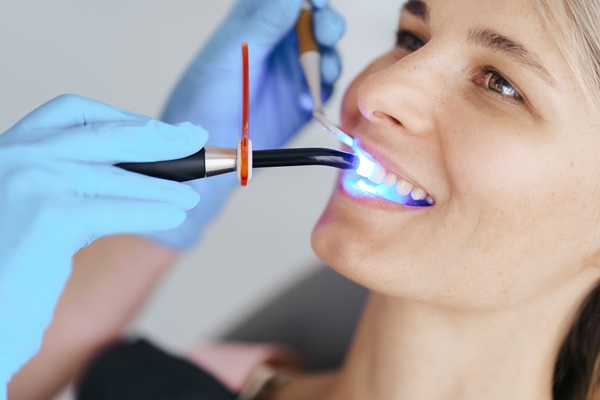How a Root Canal Is Performed Using Laser Dentistry

Laser dentistry is changing the way some dentists perform common dental procedures. This advanced dental technology utilizes special dental lasers instead of more traditional dental instruments. In addition to crown lengthening and gum disease treatment, dental lasers can also be tools for root canal procedures.
Why root canals are necessary
A root canal is necessary when a dental patient experiences an infection within their tooth. Removing this infection as quickly as possible is essential so the patient does not lose the tooth. Traditional root canal treatment includes the use of anesthesia and dental drills, while more modern root canal treatment can include using dental lasers.
According to the Academy of Laser Dentistry, today, there are dozens of indications for use with various dental laser devices. In addition, clinical applications continue to increase, making the laser one of dentistry's most exciting advances with unique patient benefits.
How laser dentistry is used to perform root canals
Soft tissue lasers offer dental patients a few advantages. Using dental lasers means that patients can experience less bleeding during and after their root canal and less swelling, which, in turn, often means less pain and the ability to heal in a faster timeframe.
Lasers first remove infected tissue
Dental lasers use a special light beam to remove infected tissue in a patient's tooth. Lasers are useful during root canal procedures because they are precise and allow dental professionals to treat the infected tooth accurately. In addition, the laser eliminates tooth bacteria which sterilizes it.
Filling the tooth
After laser treatment, the tooth is filled using a type of dental filling material. Dental patients need to choose the type of material they want before their root canal appointment. Some of the more common filling choices include porcelain, gold, and amalgam. Dental fillings can last anywhere from 10 to 30 years, depending on the type of material chosen.
Using lasers means less discomfort
Typically, patients who undergo dental laser treatment for root canal procedures experience less discomfort or pain than they would with more traditional root canal procedures. Some dental patients may experience no pain, while others will have more difficulty. While each patient's experience is different, our team takes time to get to know each patient and figure out how to make them comfortable during dental procedures.
Root canals save teeth
Once a tooth is lost, it needs replacing to maintain good oral health. However, root canal procedures can save many different teeth. Your teeth are meant to last a lifetime, which is why root canal procedures are vital. They allow many people to save their teeth and avoid expensive teeth replacement options. However, some patients are nervous about the discomfort often associated with a traditional root canal. Luckily, laser dentistry technology may provide them with a more comfortable alternative. If you want to learn more about laser dentistry and if it is right for you, we can help.
Are you considering laser dentistry in the Maricopa area? Get more information at https://smileydentalmaricopa.com.
Check out what others are saying about our dental services on Yelp: Laser Dentistry in Maricopa, AZ.
Related Posts
Looking for a general dentist who offers laser dentistry services? This advanced dental treatment option is growing in popularity every day, as it offers various benefits that are not available using other treatment options. For example, according to the American Dental Association, lasers are used to reshape gums and remove bacteria during root canal procedures.A…
Laser dentistry has been a popular method of dental care for the last several decades. Lasers are perceived as less painful and more effective than traditional dental treatment methods and can be used for a variety of procedures with a high degree of precision.With the use of lasers for dental procedures, patients experience less pain,…
An immediate visit to an emergency dentist becomes necessary when severe tooth pain or infection disrupts your comfort and overall quality of life. This dental professional provides immediate evaluation and relief, particularly when a root canal is required to preserve a damaged or infected tooth. Root canal treatment from an emergency dentist can help alleviate…
Dental veneers can improve the shape, color, or symmetry of the smile in a way that looks natural. These thin restorations are bonded to the front of the teeth to enhance appearance while maintaining a natural feel. Available in both composite and porcelain materials, veneers are selected based on aesthetic goals, treatment timeline, and lifestyle.Composite…


